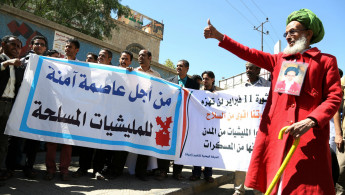Yemen's government and Houthis begin talks in US
Amid utmost secrecy and behind closed doors, meetings reportedly kicked off on Monday at the Madison Hotel in Washington between Yemeni government officials and the representatives of various Yemeni political forces.
Ostensibly in Washington for an international conference on development organised by the United Nations and the World Bank, senior advisers to Yemeni President Abd Rabbuh Mansur Hadi met with a senior member of the Ansarallah movement, also known as the Houthis, al-Araby al-Jadeed has learned.
Ali al-Emad, a member of the Houthi movement's political office, arrived in Washington at dawn on Monday, according to Yemeni and US sources. He came from Sanaa via Turkey to represent Abdul-Malik al-Houthi - the leader of the Ansarallah movement.
It is hoped the talks will lead to a new deal, which Sanaa hopes will see the Houthis commit to supporting the Yemeni government with international supervision.
Thawing relations
This is the first time the Houthi movement has sent a representative to Washington since 2003, when it adopted the slogan "Death to America, death to Israel, and may the Jews be accursed".
The same slogan has been visible on a banner flown near the US embassy in Sanaa since 21 September 2014.
Washington sources said that there had been attempts by political pressure groups to convince US Vice-President Joe Biden to attend the talks, but Biden reportedly remains reluctant to meet Emad in public.
Ahmed Awad Mubarak, the director of Hadi's office, is believed to be attending the meetings. He was once rumoured to be a front-runner for the job of prime minister - though the Houthis are understood to have blocked his appointment.
| This is the first time the Houthi movement has sent a representative to Washington since 2003. |
Hadi's adviser, Rashad al-Alimi, and Ali Naser Laksha, deputy interior minister, will also attend.
It remains unknown whether Alimi, still a leader of the General People's Congress (GPC), led by former President Ali Abdallah Saleh, represents the former president in the talks.
Diverse participation
Abdul-Karim al-Iryani, the deputy GPC leader, Yasin Said Nu'man, secretary general of the Yemeni Socialist Party, and Abdul Wahhab al-Anisi, secretary general of the al-Islah Party, may all attend.
Representatives of civil society organizations and businessmen representing the private sector in Yemen, including Ahmed Ba-Zaraah, head of the Development Team of the National Dialogue Conference, have been confirmed.
US State Department sources stressed that White House officials apologised to the embassy for not being able to meet Houthi representatives.
Yemeni Charge d'affaires Adel al-Sunaini said embassy officials had not organised the summit. "We are no more than guests in these meetings," he said. "We were not involved in their arrangements, except arrangements for meetings to be held on the sidelines by the Yemeni development minister with the World Bank for talks about the economy."
Months of preparation
Wahed al-Maitami, minister of development and international cooperation, reportedly started preparations for the Washington dialogue months before he was chosen for Hadi's new cabinet.
Maitami is reportedly planning to take the participants to New York on 22 November, to sign an agreement to commit to the economic programme of the new government - the outcome of the national dialogue.
If the Houthis agree, they will be withdrawing one of the movement's key demands - to renew subsidies on oil derivatives.
The potential signing of any new agreement in Washington or New York will reassure the international community that the political and developmental project in Yemen will succeed. If, however, Maitami fails to convince the Houthis, his future in Yemeni politics will be at risk.
Failure will mean the Houthis do not see Maitami's partnership strategy as workable. Therefore, he will have no option but to give in to their conditions. They are in a position of strength and the government is in a position of weakness.
This article is an edited translation from our Arabic edition.
Opinions expressed in this article remain those of the author and do not necessarily reflect the opinions of al-Araby al-Jadeed, its editorial board or staff.



